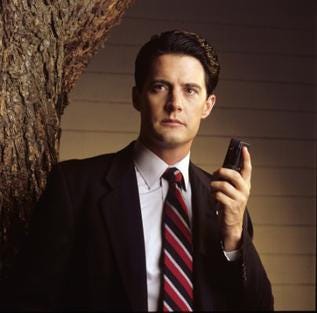David Lynch is right about your company.
Maybe our beloved ‘structure’ is just stagnation in a tie.
Agent Dale Cooper walks into Twin Peaks with a tape recorder, a black suit, and the kind of happy that makes you raise an eyebrow. He’s polite like a robot, addicted to cherry pie and black coffee, and somehow always ten steps ahead of everyone else, including the viewer. He notices what no one else sees, listens when everyone else talk, nods solemnly at red curtains and owls. In short: he’s the type of intern in the back of the room you’d normally ignore while entrenched in a quarrel about quarterly earnings, but who turns out to be the only one who read the brief.
Which brings me to the question: Do we actually get smarter with age, or are we just getting narrower-minded?
David Lynch, the director of Twin Peaks, built a career confusing the hell out of everyone. He says we don't become wiser as adults; We just lose our imagination. Harsh? Absolutely. True? Painfully. Beautiful? Very.
I stumbled upon this brutal truth in Simon van Teutem’s book, "The Bermuda Triangle of Talent"; a fantastically dark and cynical title, by the way, which immediately grabbed my attention (I guess I'm just a sucker for gloomy metaphors and rainy rural towns in the Pacific Northwest).
Lynch’s point is simple and poetically direct: when we grow older, we stop imagining new things. We swap our wild, ambitious ideas for predictable, boring certainties.
Basically, we become creatively lazy and call that ‘experience’.
Lynch presumably wrote about this in his 2006 book Catching the Big Fish; a title that sounds like a fishing manual but is actually about meditation, creativity, and other things you’d never bring up in a budget meeting. Don’t worry, I’m not pro installing compulsory Transcendental Meditation between the lunch break and the Excel training. Although the image of your most sarcastic colleague whispering mantras by (or to) the printer is too good. But the point stands: anyone guiding young talent should probably stop pretending they know everything and start wondering again.
The other point: I discovered that it’s nowhere in this book, the quote actually originates from a 1992 interview conducted by Kristine McKenna at Lynch's house in the Hollywood Hills, just after he'd returned from New York where he’d been working on music for the then upcoming Twin Peaks film with Angelo Badalamenti. So yes: the man was literally soundtracking nightmares when he casually dropped this insight.
Ok, so let’s get back to interns: All this talk of young people having a ‘fresh perspective’? That’s not fluffy corporate nonsense but an uncomfortable reminder that maybe we don't have all the answers.
Let’s question it all.
Maybe our so-called experience is just stubbornness dressed up as wisdom.
Maybe our beloved ‘structure’ is just stagnation in a tie.
Or worse: maybe it’s the interns who are trying to tell us how things should work around here.
But we’re too busy being 'experienced' to listen.
Maybe our so-called experience is just stubbornness dressed up as wisdom.
Maybe we're all characters stuck in that twilight zone between dreaming and reality; classic Lynch territory. We stubbornly insist the bizarre logic around us makes perfect sense, ignoring flickering lights, eerie music, and curtains that twitch suspiciously. Maybe the interns aren’t naive at all; maybe they're just still aware of the absurdity we've grown numb to.
So maybe the intern is like Agent Dale Cooper, still smiling, relentlessly optimistic, suspiciously observant and silently panicking; trying desperately to tell us there's something terribly wrong, knowing that things are heading south, while we just sip coffee and pretend everything is perfectly fine.
Maybe it’s time we start listening to agent Cooper; before the owls start talking and HR calls another meeting about 'innovation'.





